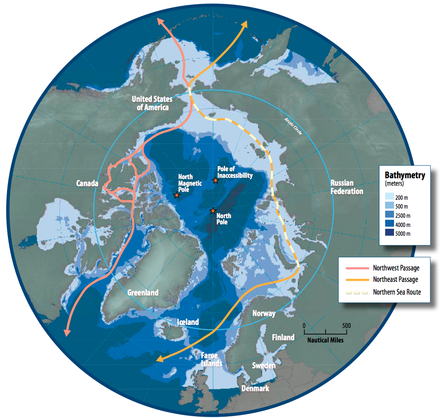The Russian Ministry of Defense has lobbied for the submission of an amendment to current Russian policy on traverse of the Northern Sea Route. From the Ministry:
“On internal maritime waters, the territorial sea and the adjacent zone of the Russian Federation.” The current law is proposed to be supplemented with a clause that provides for the possibility of passage of foreign military and government ships in the internal waters of the NSR without entering ports or naval bases with permission, which must be requested no later than 90 days.”
Until now, only commercial ships using the NSR were required to notify the Russian government 45 days in advance, even if they were not using a Russian port facility. Since the NSR enters Russian territorial waters (12NM from the coast), in some places, this restriction was not far fetched. However, this new regulation expands those declaration to 90 days, applies them to foreign warships, and requires a Russian pilot onboard. These measures will almost certainly be objected by foreign warships that wish to use the now opening Arctic.
The first transit of the NSR without icebreaker support occurred in 2017, beginning a new era in trans-Arctic shipping. Consequently, Russian restrictions on ships using the NSR have increased since foreign ships could now transit without aid of Russian icebreakers.
This measure would also require foreign submarines to transit the NSR surfaced and flying their national flag. The Russian Federation seeks to apply these restrictions throughout its entire Exclusive Economic Zone (200NM from its coast), which would encompass much of the now ice free water in the Arctic.
As Russian military buildup continues in the Arctic, as this publication reported, it is vital for the Russian Federation to exert military and economic control over the region, much to the chagrin of international governments and commercial entities which seek to capitalize on the shorter shipping route. This novel conflict zone presents an opportunity for NATO to expand its influence in the Arctic Council, especially with the addition of Finland and Sweden to the alliance.

